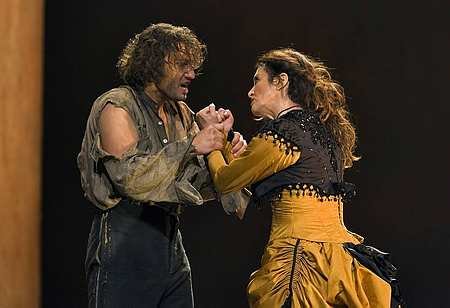|
|
|
|
|
|
|
|
| Variety.com |
| By DAVID BENEDICT |
Bizét: Carmen, Royal Opera House, London, December 2006
|
Carmen
|
| Royal Opera House, London |
|
 The title of Bizet's "Carmen" might suggest that
everything rests on the shoulders of its famously tempestuous leading
character. Not true. As Covent Garden's hotly anticipated new production
thrillingly proves, this most dramatic of operas only achieves true liftoff
when all three partners in the central fervid love triangle are on
inflammatory form. But it's not just three powerhouse lead performances that
fire up the present proceedings. Director Francesca Zambello scores a major
hit by making spectacle respectable. The title of Bizet's "Carmen" might suggest that
everything rests on the shoulders of its famously tempestuous leading
character. Not true. As Covent Garden's hotly anticipated new production
thrillingly proves, this most dramatic of operas only achieves true liftoff
when all three partners in the central fervid love triangle are on
inflammatory form. But it's not just three powerhouse lead performances that
fire up the present proceedings. Director Francesca Zambello scores a major
hit by making spectacle respectable.
Where Hitchcock, according to rumor, treated actors like cattle, Zambello
(who's about to join the Disney stable with stage tuner "The Little
Mermaid") treats cattle like actors. A live donkey ambles across the sunny
Seville square of the first act, a clutch of chickens actually laid eggs
during the first-night performance, and toreador Escamillo (Ildebrando
D'Arcangelo) makes a suitably high-status entrance on the back of a huge
black horse.
The livestock looks all of a piece on Tanya McCullin's burnt-orange,
sculptural sets of curved walls smartly reconfigured for each scene. They're
complemented by late-19th century-style costumes that mercifully banish
Spanish gypsy cliches and stick to a peasant-style palette of layered rusts,
browns, greens and creams.
The second-act set may look pretty large for a secret smugglers' tavern, but
the place is packed with activity, thanks in part to 34 extra singers,
dancers and actors in addition to the already large Opera House chorus.
Arthur Pita's flamenco-style choreography has the supreme virtue of looking
natural. The vivid, foot-stamping dancing continues the gypsies' dramatic
line rather than merely operating as token display.
If all that suggests a Seville-theme-park approach, think again. Although
Zambello's almost widescreen grandeur risks swamping the story, as soon as
the heavily populated life of each location has been established, the focus
narrows. She and conductor Antonio Pappano ensure serious storytelling via
full-blooded, intensely characterized singing.
As Carmen, Anna Caterina Antonacci is the real deal. It's not simply a
matter of a ripe, well-supported mezzo sound. Her voice may not have the
aficionado's ideal brooding luster, but this is a rare, genuinely complete
performance from a true stage animal.
Hair piled up, wide-shouldered, slim-waisted and barefoot, she effortlessly
dominates every man in sight through her sheer infectious enjoyment. Most
Carmens go for generalized "torrid" acting. Antonacci's superbly relaxed
Carmen is a triumph of attention to detail. She's alive to every moment of
stage time, which makes her riveting to watch. Even singing her "la-la-la's"
-- the score requires that a lot -- she makes every teasing phrase count.
She's given a run for her money in a career-making perf from Jonas
Kaufmann as Don Jose. Having specialized in Mozart, this role catapults him
into a whole new sphere. Out go the expected heroics; in comes subtle
phrasing in a role that normally consists of smoldering and showing off.
Kaufmann carefully builds intensity from a studiedly casual start to a
powerful love-wrecked final scene. Better still, instead of floridly
over-singing his second-act declaration of passion (a favorite tenor habit),
he pulls auds toward him by dropping to a brave, quiet, uncovered sound at
the very top of his voice. It also won't hurt his prospects that he's a
completely convincing actor who is tall, slim and handsome to boot.
Escamillo has less to play with, but D'Arcangelo uses his wide-ranging
bass-baritone to proud effect whether leaping on and off tables or playing
to his adoring crowd. As he knocks out the opera's greatest hit, it's
abundantly clear that this man can not only seduce Carmen but successfully
fight bulls.
Heat surges throughout the production and not just from Paule Constable's
lighting, which ranges from the opening scene's hot afternoon to the
scalding gleam of overhead noonday sun for the final-act bullfight. From the
very beginning, the orchestra rips into the overture as if their lives
depended upon it. Yet Pappano doesn't drive the score too hard. His
more-haste-less-speed approach allows the music to breathe, with the
all-important woodwind given due prominence.
He and Zambello effectively create a new edition of the score midway between
the original version's spoken dialogue and the later addition of recitative.
Most of the latter has been scrapped to sharpen the action, which is also
the reasoning for a cut at the beginning of the final act.
The fact that this production is being filmed by BBC TV will encourage the
edition's further uptake. The Royal Opera's last "Carmen" opened in 1991 and
was last revived here in 1994. Zambello's production, which has already
virtually sold out a long run, not only fills a crucial repertoire gap, it
deservedly looks set to last for years.
|
|
|
|
|
|
|
|
|
|
|
|
|
|
|
|
|
|
|